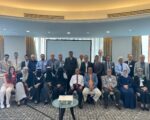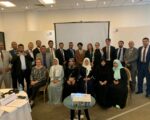
From 31 May to 1 June 2023, the OECD hosted a workshop in Jordan, aiming to develop a strategic plan for infrastructure and define the preconditions for infrastructure financing. The infrastructure event brought together key officials from national and subnational government and financial institutions, local and regional private sector stakeholders, alongside international and regional experts.
The objective of the infrastructure workshop was to provide a forum to discuss the challenges and opportunities faced by different stakeholders engaged in promoting Yemen’s resilient recovery and the role of infrastructure investment and reconstruction in achieving these goals. More specifically, international experts shared knowledge and experience with representatives from the Yemeni public and private sectors on:
- Opportunities and risks of financing infrastructure for reconstruction and resilience
- The role of the private sector in financing infrastructure and building back trust
- Successful infrastructure financing mechanisms in conflict areas
- Subnational approaches to rebuilding and developing resilient infrastructure
- Material assessments and reconstruction of transport network infrastructure
- Support for resilient reconstruction of social infrastructure
In the first infrastructure session, the Yemeni MoF, the Executive Bureau for Aid Absorption, the IFC and the Islamic Development Bank highlighted the preconditions needed to incentivize financing and create an environment for the successful reconstruction of infrastructure. There was an emphasis on the need to target the energy and transportation sectors to spur development efforts, address domestic consumption needs and support humanitarian relief efforts. In the subsequent infrastructure sessions, which focused on the role of the private sector, opportunities to build trust and a review of successful infrastructure financing mechanisms using other conflict-afflicted case studies, it became increasingly evident that restoration of trust between the private and public sectors is critical, as the two don’t see eye to eye on several issues. International partners addressed the Yemeni government’s inability to attract external funding, along with internal coordination issues. They noted that there was an interest in investments, not grants; however, the situation on the ground, as well as the governance issues in the country, have stymied this desire.
The infrastructure workshop included sessions dedicated to exploring reconstruction opportunities across different sectors, namely the transportation, health and social sectors. Each of the sessions brought in insights from Yemeni participants associated with the respective sectors mentioned above, along with expertise from speakers from international organizations.
The main takeaways from the infrastructure sessions were:
- Yemeni Authorities are searching for a comprehensive national economic strategy coupled with effective local implementation. Although many participants referred to a "national strategy", nobody offered specific details.
- Communication among Yemeni public institutions is lacking and is partially responsible for coordination issues. In effect, government agencies remain siloed, which has stymied the effective use of donor funding.
- There is also a disconnect between private and public actors, as representatives from the private sector highlighted their frustration with the lack of government support despite their crucial role in providing essential goods and services.




Leave a Reply
You must be logged in to post a comment.